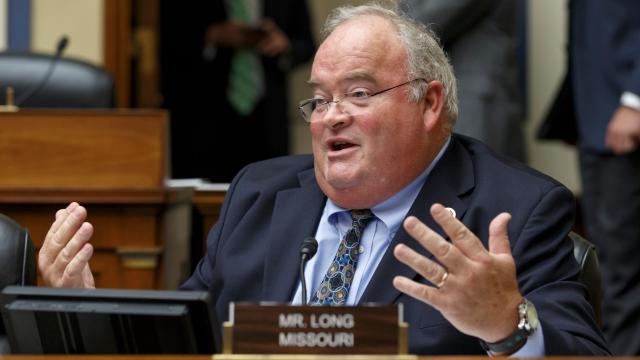Today, Mark Zuckerberg faced some tougher questions from the House than he did in yesterday’s US Senate hearing. And one GOP Congressman decided to throw Zuck a bone by bringing up his original sin: Facemash. Mark didn’t seem happy.
Photo: AP
Today’s hearing has shown a stronger divide in the line of questioning coming from each party. As Facebook CEO Mark Zuckerberg faces intense public scrutiny about privacy, security and election interference, US House members on the Republican side have devoted a lot of time to stress that they don’t like regulations. Missouri Representative Billy Long attempted to paint an example of why regulations would be bad for innovation, and seemed to give Zuck a little tough-love advice.
Zuckerberg loves to bring up Facebook’s humble dorm room origins, and it seems that Congressman Long wanted to take Zuckerberg on a walk down memory lane by reminding him of where this all started and suggesting that a lack of regulation helped Facebook become the unstoppable force it is today. Zuckerberg didn’t seem to have a talking point ready when Long asked, “What was Facemash, and is it still up and running?” Zuckerberg answered:
Congressman, Facemash was a prank website that I launched in college in my dorm room before I started Facebook. There was a movie about this, or it said it was about this. It was unclear truth. And the claim that Facemash was somehow connected to the development of Facebook – it isn’t. It wasn’t –
Zuckerberg’s response is also a bit of “unclear truth”. Facemash was arguably a precursor to Facebook. If nothing else it planted seeds for what the social network would become in so many respects. The site was a way for Harvard students to rank whether their peers were hot or not, foreshadowing the debasement and humiliation we’d all feel as social media found its footing. As Wired recently pointed out, the site was created by “nonconsensually scraping pictures of students at Harvard from the school’s intranet”. Disregard for privacy and intellectual property? Check and check. It was massively popular on campus despite the misgivings that many students had about it. And it all came to an end with the first Mark Zuckerberg public apology. He wrote in a letter in 2003:
I understood that some parts were still a little sketchy and I wanted some more time to think about whether or not this was really appropriate to release to the Harvard community.
I hope you understand, this is not how I meant for things to go, and I apologise for any harm done as a result of my neglect to consider how quickly the site would spread and its consequences thereafter… I definitely see how my intentions could be seen in the wrong light.
It doesn’t seem as though Long really understands what this chapter in Zuckerberg’s history means to him or the company that he subsequently founded. “I took it down – actually, it has nothing to do with Facebook,” Zuckerberg told the Congressman. Long was undaunted in charging ahead with his lesson, telling the CEO:
But from that beginning, whether it was actually the beginning of Facebook or not, you’ve come a long way. If I was you, a little bit of advice – Congress is good at two things: Doing nothing and overreacting. So far, we’ve done nothing on Facebook since your inception in that Harvard dorm room, many years ago. We’ve done nothing on Facebook. We’re getting ready to overreact, so just take that as a shot across the bow warning to you.
Before Zuckerberg could react any further, Long launched into a diatribe about conservative commentators Diamond and Silk getting their Facebook page suspended.
It’s hard to say if Long’s point was lost in this Facemash reminder. He was telling Zuckerberg that his business has become an enormous entity with little competition or restriction on what it can collect on its users. He was saying that it rapidly found itself in that position because legislators never stepped in to make any judgements about how Facebook could be harmful to individuals, society and the business community. And he was saying that Zuckerberg should make some quick changes so that no authorities ever stop to consider those things.
If nothing else, Long made it clear that people such as him would inevitably screw up whatever regulations they end up cobbling together.
[C-Span]
